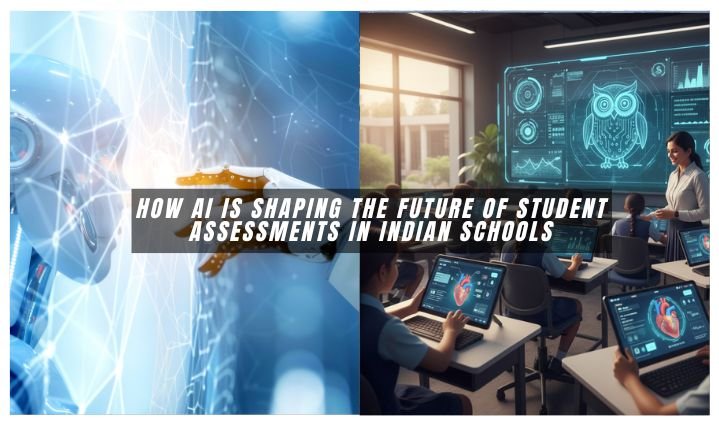AI is revolutionising how student assessments are conducted in Indian schools, reshaping them into more dynamic, accurate, and personalised experiences for learners and educators alike. With the rapid advancement of education technology and a policy shift towards continuous, competency-based learning, Indian schools are placing AI at the core of assessment reform.
The Shift from Traditional to AI-Driven Assessments
For decades, Indian student assessments have focused mainly on exams that test memorisation, often missing out on capturing real understanding and skills. The National Education Policy (NEP) 2020 has triggered a shift towards holistic, formative, and competency-based evaluation. AI steps into this scenario by streamlining assessment processes and delivering deep insights promptly. Through Optical Character Recognition (OCR), Optical Mark Recognition (OMR), and adaptive testing platforms, schools are moving away from the “one-size-fits-all” model to a data-driven, personalised approach.
How AI Transforms the Assessment Experience
AI-powered assessment systems enable teachers to go far beyond pen-and-paper tests. Adaptive testing tools adjust difficulty levels in real-time based on student responses, ensuring that students are neither overwhelmed nor unchallenged. AI enables the analysis of large datasets, identifying patterns, strengths, and learning gaps across cohorts. This empowers teachers to intervene early and design targeted, effective teaching strategies.
Automated grading systems reduce subjectivity and human error, delivering consistent and reliable results. Educators can now devote more time to mentoring rather than administrative work, as AI-powered platforms automate question paper generation, answer sheet scanning, and instant grading.
Personalisation and Inclusivity
Every learner is unique, and AI plays a critical role in tailoring assessments and feedback to individual needs. AI tools analyse past performances to create bespoke learning paths, suggest remedial content, and provide instant feedback. Such personalisation allows for inclusive strategies, recognising diverse learning styles, abilities, and linguistic backgrounds. AI-powered platforms also facilitate multilingual assessments and support students with disabilities using assistive technologies.
Instant Feedback and Early Intervention
One of the biggest advantages of integrating AI in student assessments is real-time analytics. Instead of waiting weeks for results, students receive instant, actionable feedback, which helps them focus on improvement areas immediately. Teachers gain access to dashboards that highlight class and individual performance, enabling timely interventions for struggling students.
For example, Rajasthan’s state-wide implementation of AI-based oral reading fluency tests and digital evaluation systems has assessed millions of students in a matter of days, providing quick remediation cycles.
Gamification and Student Engagement
AI-driven assessments make learning more engaging through interactive quizzes and gamified challenges. By transforming standard tests into exciting, game-like experiences, these systems reduce test anxiety and motivate students to participate enthusiastically. This not only increases student engagement but also improves knowledge retention and application.
Teacher Empowerment, Not Replacement
Contrary to popular fears, AI does not replace teachers; rather, it empowers them. AI-driven analytics highlight learning gaps and suggest targeted strategies but leave the last-mile decision-making and personalised mentoring to teachers. Teachers remain central in guiding, motivating, and supporting students, while AI takes care of repetitive tasks and complex data analysis.
Policy Support and Scalability
With millions of students and a dynamic policy framework supporting EdTech adoption, India is uniquely placed to scale up AI-powered assessment systems. From Rajasthan to Madhya Pradesh, state-wide implementations have demonstrated the capacity for rapid improvements in assessment accuracy, speed, and transparency, providing critical data not only for teaching but also for policymaking.
Challenges and Cautions
Despite its promise, AI adoption in student assessments is not without challenges. Issues related to data security, equity in technology access, teacher training, and algorithmic bias require careful management. Policymakers and institutions must ensure robust digital infrastructure and ethical AI practices, alongside continuous feedback from users.
Read more: Kendriya Vidyalaya Greater Noida Expressway | Top CBSE Schools in Noida
The Road Ahead
As Indian schools continue to embrace AI, the future of student assessments looks adaptive, transparent, and growth-focused. With real-time insights, personalised feedback, and rapid scalability, AI is making assessments more meaningful for every stakeholder in the education ecosystem—students, teachers, and policymakers alike.
Embracing AI in assessments is not only about technology, but about building an environment where every learner receives timely support and every educator has actionable insights for student success—driving India closer to its goal of holistic, equitable, and effective education.

